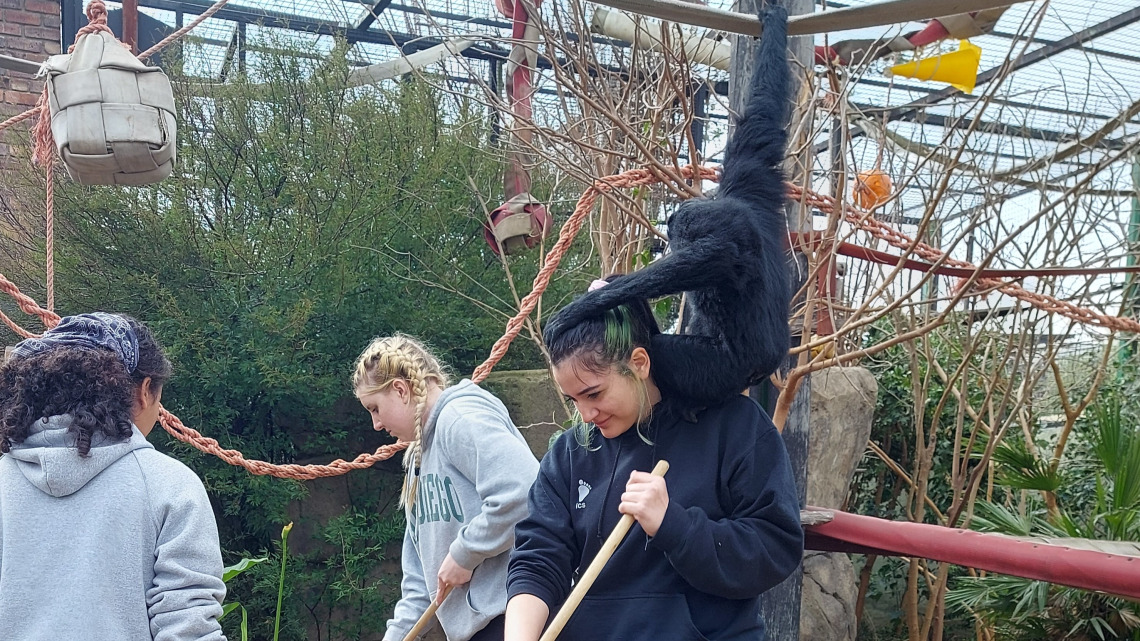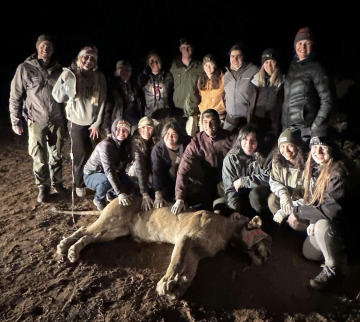From Costa Rica to South Africa: A Vet Science Student Abroad
Student Profile: Isabel Tejada

It’s not every day that a student gets to draw blood from a lion or face down a young bull elephant.
For Isabel Tejada, however, those were just some of the highlights of her most recent study abroad experience.
Building a Post-Covid Community
Raised in Phoenix, Isabel comes from an ASU family. But when she heard about a new College of Veterinary Medicine with a complementing pre-vet program track, Isabel only applied to one school: the University of Arizona. Now a senior, she’s finishing up her B.S. in Veterinary Science, with an emphasis in applied animal behavior, and minors in natural resources and biochemistry.
Isabel began her Arizona studies just as the campus was reopening after Covid-related closures. The forced distance had left Isabel feeling isolated, so she decided to reach out and find ways to build community on campus – starting with campus clubs.
Looking back now, she says, “I wanted the experience side of it, but I also wanted to meet people and gain a community at the U of A.”
During her time at Arizona, she joined the pre-vet club (serving as a club officer), the UA Fish and Wildlife Society Chapter (serving as a club officer), and UA VIDA Club.
It was in VIDA Club that she first heard about the study abroad opportunities in Costa Rica.
Rural Animal Surgery in Costa Rica
During Isabel’s sophomore year, VIDA Volunteers visited the club and gave a presentation about the medical work they do with cats and dogs in Costa Rica and Guatemala. VIDA coordinates the entire trip for students, managing the details and providing pre-trip training. Isabel decided to venture beyond the traditional classroom environment and spent two immersive weeks in Costa Rica, gaining invaluable hands-on experience.
Once her team arrived in Costa Rica, they stayed in the city and drove out to the rural areas for surgery days. Students would work alongside local veterinarians, rotating through various roles: intake, medication and sedation (under supervision), IV catheter and ET tube administration, surgery assistance and observation, and recovery. Isabel and the other students would also give treatments for fleas, ticks and worms. For some local pet owners, this would be the only animal care available to them.
Though she didn’t get college credit for the Costa Rica study abroad trip, Isabel recommends the program as a first step into international veterinary medicine. Not only do students get hands-on experience treating animals in different settings, but they also gain connections with practitioners and other students.
Camping in a South African Game Reserve
Encouraged by her experience in Costa Rica, Isabel embarked on another study abroad journey – this time to South Africa for college credit – with Loop Abroad. Loop Abroad gave a presentation at the university’s pre-vet club, and Isabel knew she’d never get this same opportunity in the United States.
Isabel recalls her time at the Selati Game Reserve in South Africa as the “best experience of my life” – two weeks camping deep in the wild, surrounded by animals.
Each morning, the students ventured out on a 3-hour game drive, identifying, counting and logging different species of animals. They also learned how to reset the camera traps and use telemetry to locate large predators that had been radio-collared. In the lab, they studied blood and feces samples from lions, leopards, hyenas and deer.

Students radio-collaring a sedated lioness
During one of these labs, Isabel assisted with radio collaring a lioness who had a tendency to escape the reserve. For the lioness’s own safety, and the safety of the neighboring communities, a veterinarian was called in to sedate the animal and demonstrate the collaring process to the students.
Isabel learned important wildlife skills in the reserve, such as how to avoid startling a lion (“Remain seated in the vehicle at all times.”) or what to do if a bull elephant charges the vehicle (“Do not back up the vehicle – stand your ground.”)
These experiences inspired her to pursue her applied animal behavior degree emphasis. She says, “There are so many ways that animals communicate with us; we just have to pay attention.”
In addition to the time in the Selati Game Reserve, students also spent two weeks at the Lory Park Zoo in Midrand, South Africa, where they cleaned exhibits, interacted with animals, and gave presentations to zoo patrons. Isabel was especially interested to learn about the animals requiring extra medical care (diabetes, cerebral palsy, old age care, etc.).
From the reserve guides to the zookeepers to the international mix of fellow students, Isabel is grateful for the connections she created during her Loop Abroad experience.
Final Advice for Pre-Vet Students
With graduation on the horizon, Isabel offers this helpful advice to other students: prioritize self-care and maintain connections outside of academic pursuits; embrace imperfection and don't hesitate to seek clarification or assistance when needed; and recognize that your worth extends beyond your GPA.
Amidst the rigors of veterinary school preparation, Isabel emphasizes the importance of unity, personal growth, and staying true to oneself, urging students to strive for excellence without succumbing to comparison or competition.
As a recipient of the National Scholar Award, the Hope I. Jones Scholarship, and the American Indian College Fund, Isabel recommends utilizing ASEMS for resume and cover letter preparation and WISP for writing support. Isabel also earned Dean’s List with Distinction, the CALES Leadership Award (Copper cord), and Highest Academic Distinction for all three years.
Finally, Isabel encourages students to develop effective time management strategies. At one point in her college career, she was working four different jobs while volunteering, which required her to stick to a regimented color-coded scheduling system.
A Future That Benefits the Whole Planet
For her future career path, Isabel plans to pursue wildlife conservation and rehabilitation medicine. Though she likes companion animals, she hopes to work with larger animals. Her dream is to work for a government agency and do population management and disease control, finding a job that offers both research and hands-on application.
Isabel says her goal is to “find a health focus that benefits the whole planet. We have to consider the animals, the people, and the plants – and how we all impact each other.”
From cats in Costa Rica to elephants in South Africa, to animals at clinics here in Tucson – Isabel’s diverse university experience reflects the holistic approach she’ll take with her after graduation.
